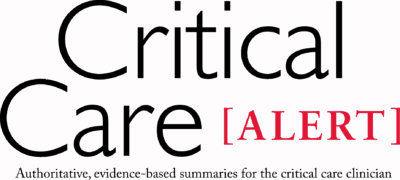
Critical Care Alert – December 1, 2003
December 1, 2003
View Issues
-
Benefits of Ethics Consultation When Life-Sustaining Treatments are Unlikely to be Beneficial
In this randomized control trial, Schneiderman and Associates evaluated the effect of an intervention, namely, an ethics consultation, on several variables associated with the care of patients eventually dying in the ICU. -
Computerized Medical Databases in the ICU
Measuring the quality of a complex service like critical care that combines the highest technology with the most intimate caring is a challenge. Recently, consumers, clinicians, and payers have requested more formal assessments and comparisons of the quality and costs of medical care. -
New Regulations Expected to Affect ICU Population
New rules put forth by the bush administration that took effect on Nov. 10 significantly relax strictures in the 1986 Emergency Medical Treatment and Labor Act (EMTALA) that required hospitals and some hospital-owned clinics to examine and treat people who need emergency medical care even when those patients cant pay. -
Universal Consent Forms Raise Questions of Ethics
Using a universal consent form for multiple procedures anticipated for a patient can nearly double the consent rate for most of the invasive procedures performed in an intensive care unit, according to researchers in Chicago. But observers say the tactic may violate the spirit of the informed consent process. -
Eight Common Procedures
The universal consent form described eight commonly performed procedures: placement of an arterial catheter, a central venous catheter, a pulmonary artery catheter, a peripherally inserted central catheter, lumbar puncture, thoracentesis (surgical puncture through the chest wall with drainage of fluid from the thoracic cavity), paracentesis (surgical puncture through the abdominal wall with drainage or aspiration of fluid from the abdominal cavity), and intubation/mechanical ventilation. -
Checkoffs Play Key Role in SICU Improvement
A patient daily goals checkoff form used twice daily during rounds has helped the surgical intensive care unit (SICU) team at Hartford (CT) Hospital achieve a 25% drop in its mortality rate, while cutting lengths of stay and ventilator days. -
Pharmacology Watch: Eplerenone Cleared for CHF Patients with Sustained MI
The FDA has approved Pfizer's eplerenone (Inspra) for the treatment of congestive heart failure (CHF) in patients who have sustained a myocardial infarction. -
Clinical Briefs in Primary Care Supplement
